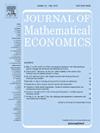A Single Relation Theory of Welfarist Social Evaluation
IF 0.7
4区 经济学
Q3 ECONOMICS
引用次数: 0
Abstract
The paper develops a systematic relational theory of social welfare evaluation. It is formulated in terms of a single difference relation capturing basic well-being comparisons between social alternatives. A new Fundamental Equity condition deals with trade-offs between individuals. It provides a unified rationale for different two-person conditions and identifies deep connections between seemingly distinct approaches to social evaluation. Dependent on the extent of interpersonal comparability, Strong Pareto and Fundamental Equity characterize Simple Majority Relation, Leximin, Utilitarianism, a level-based Borda Relation, and a new class of Equitable Welfarist Relations. They yield a general impossibility given weak incomparability. The analysis covers social evaluation under uncertainty, variable populations, and preference foundations of well-being comparisons. The relational theory is more general and more unified than the prevalent theory of Social Welfare Functionals. It does not use contestable inter-profile conditions and invariance requirements.
福利主义社会评价的单一关系理论
本文建立了系统的社会福利评价关系理论。它是根据一个单一的差异关系来制定的,它捕捉了社会选择之间的基本福利比较。一个新的基本公平条件处理个人之间的权衡。它为不同的两个人条件提供了统一的理论基础,并确定了看似不同的社会评价方法之间的深层联系。根据人际间可比性的程度,强帕累托和基本公平描述了简单多数关系、列克西敏、功利主义、基于层次的博尔达关系和一种新的公平福利主义关系。由于弱的不可比较性,它们产生了一般的不可能性。分析涵盖了不确定性下的社会评价、可变人口和福利比较的偏好基础。关系理论比流行的社会福利函数理论更普遍、更统一。它不使用可争用的配置文件间条件和不变性要求。
本文章由计算机程序翻译,如有差异,请以英文原文为准。
求助全文
约1分钟内获得全文
求助全文
来源期刊

Journal of Mathematical Economics
管理科学-数学跨学科应用
CiteScore
1.70
自引率
7.70%
发文量
73
审稿时长
12.5 weeks
期刊介绍:
The primary objective of the Journal is to provide a forum for work in economic theory which expresses economic ideas using formal mathematical reasoning. For work to add to this primary objective, it is not sufficient that the mathematical reasoning be new and correct. The work must have real economic content. The economic ideas must be interesting and important. These ideas may pertain to any field of economics or any school of economic thought.
 求助内容:
求助内容: 应助结果提醒方式:
应助结果提醒方式:


